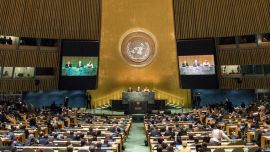The International Monetary Fund (IMF) on Saturday called on Argentina to adopt "a stronger policy package" to “safeguard stability” in the face of economic crisis and a punishing drought.
The remarks, delivered in a press release after the IMF’s Executive Board on Friday approved a fourth quarterly review of Argentina’s 30-month extended fund facility (EFF) programme, came as the multilateral lender signed off on an immediate disbursement of around US$5.4 billion for the nation.
The IMF also confirmed that it would lower agreed targets on Central Bank reserve accumulation in response to the ongoing crisis.
In the context of severe drought, rising inflation and weak reserve coverage, "a stronger policy package” is needed from Argentina’s government to “safeguard stability, address setbacks and secure programme objectives," said the international lender.
President Alberto Fernández’s government and the IMF agreed a new credit programme in March 2022 that restructured Argentina's US$44.5-billion debt with the lender. With this latest tranche of US$5.4 billion, the country has received US$28.9 billion to date,
Under the terms of the deal, Argentina’s government must build up its international reserves and progressively reduce the country’s fiscal deficit from three percent of gross domestic product in 2021 to 2.5 percent in 2022, 1.9 percent in 2023 and 0.9 percent in 2024.
Last year, the deficit reached 2.3 percent of GDP and net international reserves increased by US$5.4 billion, above the previously agreed target of US$5 billion.
In its statement, the IMF acknowledged that “all quantitative performance criteria through end-December 2022 were met with some margin.”
"More prudent macroeconomic policies in the second half of 2022 supported a moderation in inflation and improvements in fiscal and external balances, helping to secure end-2022 program targets," said Gita Gopinath, the IMF's second-in-command, quoted in the statement.
In a concession to Argentina, Gopinath revealed that “some downward adjustments to reserve accumulation targets” would be warranted in the wake of the punishing drought that is expected to shave billions off national GDP.
Consequently, “a stronger policy package is now necessary to safeguard stability and maintain the anchoring role of the programme,” she warned.
‘Challenging situation’
The IMF said that Argentina’s economic situation had become “more challenging since the beginning of this year in light of the increasingly severe drought and policy setbacks.”
President Fernández had made the same point a few days earlier during a meeting at the White House with his US counterpart, Joe Biden, whose country is the IMF's largest financial contributor and holds the largest voting share on the board.
The country's drought, the worst since 1929, "has greatly complicated" the economy, argued Fernández, who claims to have obtained Biden's support at international lending organisations.
Yet in her call for a “stronger policy package,” Gopinath – who met with Economy Minister Sergio Massa in Washington on Wednesday – insisted that the 2023 primary fiscal deficit target of 1.9 percent is an “essential” target if Argentina is to “ support disinflation and reserve accumulation, alleviate financing pressures, and strengthen debt sustainability.”
To that end, she concluded that “additional macroeconomic policy tightening and further modifications to [exchange rate” policies may be required in the coming months.
In a nod to internal disagreement in the ruling Frente de Todos coalition over the IMF’s role and general elections later this year, Gopinath declared that “political support for programme policies remains critica” moving forward.
Among other measures, the IMF’s number two wants the government to continue implementing measures to eliminate energy subsidies for better-off and commercial users. Gopinath also said “the fiscal cost of the new pension moratorium should be mitigated through strong regulations to target entry only to those with the greatest need.”
“Real interest rates should remain sufficiently positive to tackle high inflation and support demand for peso assets. Further rate increases may be warranted in the event of further inflation shocks or intensification of FX pressures,” said the IMF.
Argentina has a complicated system of currency controls with one official rate and several parallel exchange rates.
However, "interventions in the parallel FX market using reserves or short-term external debt instruments should be eschewed," warned Gopinath, who said exchange restrictions should be rolled back as conditions permit.
“They are no substitute for sound macroeconomic policy,” said the IMF official.
Argentina’s recorded growth of 5.2 percent last year, but inflation remains very high, totalling 94.8 percent in 2022, a three-decade high. Most products cost twice as much as they did at the same time last year, in a country where poverty reaches 39.2 percent of the population, according to official data.
A week ago, Fitch Ratings downgraded Argentina's foreign currency debt rating from CCC- to C, the lowest level above default, because it considers default to be "imminent.”
– TIMES/AFP

























Comments